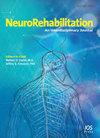Overview of randomized controlled trials of moderate to severe traumatic brain injury: A systematic review
IF 1.8
4区 医学
Q3 CLINICAL NEUROLOGY
引用次数: 0
Abstract
BACKGROUND: Given the complexity of post-TBI medical, surgical, and rehabilitative care, research is critical to optimize interventions across the continuum of care and improve outcomes for persons with moderate to severe TBI. OBJECTIVE: To characterize randomized controlled trials (RCTs) of moderate to severe traumatic brain injury (TBI) in the literature. METHOD: Systematic searches of MEDLINE, PubMed, Scopus, CINAHL, EMBASE and PsycINFO for RCTs up to December 2022 inclusive were conducted in accordance with PRISMA guidelines. RESULTS: 662 RCTs of 91,946 participants published from 1978 to 2022 met inclusion criteria. The number of RCTs published annually has increased steadily. The most reported indicator of TBI severity was the Glasgow Coma Scale (545 RCTs, 82.3%). 432 (65.3%) RCTs focused on medical/surgical interventions while 230 (34.7%) addressed rehabilitation. Medical/surgical RCTs had larger sample sizes compared to rehabilitation RCTs. Rehabilitation RCTs accounted for only one third of moderate to severe TBI RCTs and were primarily conducted in the chronic phase post-injury relying on smaller sample sizes. CONCLUSION: Further research in the subacute and chronic phases as well as increasing rehabilitation focused TBI RCTs will be important to optimizing the long-term outcomes and quality of life for persons living with TBI.中重度脑外伤随机对照试验概述:系统回顾
背景:鉴于创伤性脑损伤后医疗、手术和康复护理的复杂性,研究对于优化整个护理过程中的干预措施和改善中重度创伤性脑损伤患者的预后至关重要。目的:分析文献中关于中重度创伤性脑损伤(TBI)的随机对照试验(RCT)的特点。方法:根据 PRISMA 指南,对 MEDLINE、PubMed、Scopus、CINAHL、EMBASE 和 PsycINFO 中截至 2022 年 12 月(含)的 RCT 进行系统检索。结果:1978 年至 2022 年间发表的 662 项 RCT(共 91,946 人参与)符合纳入标准。每年发表的研究论文数量稳步增长。报告最多的创伤性脑损伤严重程度指标是格拉斯哥昏迷量表(545 项研究,82.3%)。432项(65.3%)研究实验侧重于内科/外科干预,230项(34.7%)涉及康复治疗。与康复治疗研究相比,内科/外科治疗研究的样本量更大。康复研究仅占中度至重度创伤性脑损伤研究的三分之一,而且主要是在受伤后的慢性阶段进行,样本量较小。结论:进一步开展亚急性和慢性阶段的研究,以及增加以康复为重点的创伤性脑损伤 RCT,对于优化创伤性脑损伤患者的长期治疗效果和生活质量非常重要。
本文章由计算机程序翻译,如有差异,请以英文原文为准。
求助全文
约1分钟内获得全文
求助全文
来源期刊

NeuroRehabilitation
CLINICAL NEUROLOGY-REHABILITATION
CiteScore
3.20
自引率
0.00%
发文量
178
审稿时长
6-12 weeks
期刊介绍:
NeuroRehabilitation, an international, interdisciplinary, peer-reviewed journal, publishes manuscripts focused on scientifically based, practical information relevant to all aspects of neurologic rehabilitation. We publish unsolicited papers detailing original work/research that covers the full life span and range of neurological disabilities including stroke, spinal cord injury, traumatic brain injury, neuromuscular disease and other neurological disorders.
We also publish thematically organized issues that focus on specific clinical disorders, types of therapy and age groups. Proposals for thematic issues and suggestions for issue editors are welcomed.
 求助内容:
求助内容: 应助结果提醒方式:
应助结果提醒方式:


